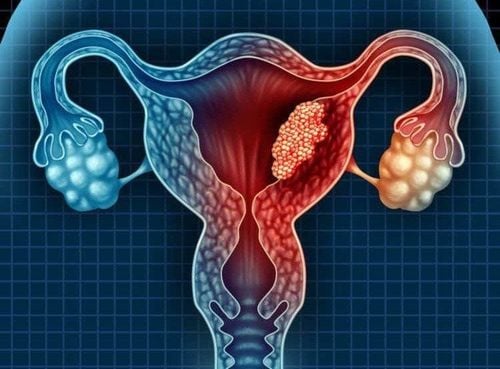This is an automatically translated article.
Weight gain during menopause is often closely related to hormonal changes and body metabolism. According to statistics, about 30% of women in menopause age are not only overweight but also obese.
1. Women's reproductive life cycle
The periods of hormonal changes that occur in a woman's life are perimenopause and menopause, post-menopause.
1.1 Perimenopause
Perimenopause begins at puberty, starting with the first menstrual period and ending with the last.
Perimenopause literally means around menopause. During this time, estrogen levels become erratic and progesterone levels drop.
This transition usually occurs around the mid-30s. Symptoms of perimenopause include:
Hot flashes and heat intolerance Sleep disturbances Menstrual cycle changes Headaches Mood changes , such as irritability, depression, anxiety, weight gain.
1.2 Menopause
Menopause officially occurs when a woman has had her period for 12 months. The average age of menopause is 51 years.

Phụ nữ bước vào thời kì mãn kinh thường ở độ tuổi 51
1.3 Post-menopause
Post-menopause begins as soon as a woman has gone 12 months without a period.
2. Changes in hormones affect metabolism
In the early stages of perimenopause, the ovaries normally produce extremely high amounts of estrogen. This is due to impaired feedback signals between the ovaries, hypothalamus, and pituitary gland.
Later in perimenopause, when the menstrual cycle becomes more irregular, the ovaries produce very little estrogen. They produce even less during menopause. Some studies suggest that high estrogen levels may promote fat gain.

Estrogen cao báo hiệu sự suy yếu giữa buồng trứng, vùng dưới đồi và tuyến yên.
3. Weight changes during perimenopause
Low estrogen levels in the late stages of menopause can also impair the function of leptin and neuropeptide Y, hormones that control satiety and appetite. As a result, late perimenopausal women with low estrogen levels may be motivated to eat more calories. The combination of low estrogen and progesterone may further increase the risk of obesity.
4. Weight change during and after menopause
In addition to a number of other factors that can contribute to weight gain after menopause. Postmenopausal women are often less active than they were in their youth, which reduces energy expenditure and leads to loss of muscle mass. Postmenopausal women also frequently have higher fasting insulin levels and insulin resistance, which contributes to weight gain and an increased risk of heart disease. Hormone replacement therapy has been shown to be effective in reducing belly fat and improving insulin sensitivity during and after menopause.

Mức insulin lúc đói cao hơn ở phụ nữ mãn kinh làm tăng nguy cơ mắc bệnh tim
5. How to prevent weight gain during menopause
Here are some things you can do to prevent weight gain during menopause:
Reduce carbs: Cut carbs to reduce the increase in belly fat, which causes metabolic problems. More fiber: Eating a high-fiber diet that includes flaxseeds, may improve insulin sensitivity. Workout: Engage in strength training to improve body composition, increase strength, and build and maintain lean muscle. Rest and relax: Try to relax before bed and get enough sleep to keep hormones and appetite well-managed. Any questions that need to be answered by a specialist at Vinmec International General Hospital, please book an appointment on the website to be served.
References: mayoclinic.org, healthline.com
Please dial HOTLINE for more information or register for an appointment HERE. Download MyVinmec app to make appointments faster and to manage your bookings easily.
MORE
Common disorders when entering perimenopause How many years does perimenopause last before menstruation stops? At what age does perimenopause usually begin?













